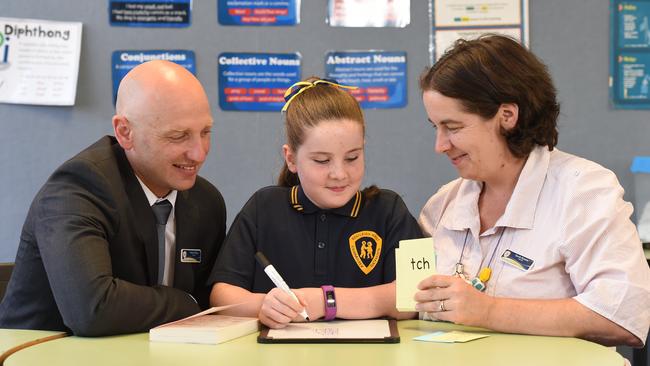Principals urged to adopt maths methods of seven ‘exemplary’ schools
Australia’s leading public policy think tank has urged school principals to take a leaf out of the books of seven standout schools and not ‘wait for others to act’ on declining numeracy skills.

Seven standout schools have been commended for exemplary maths teaching, with a new research report urging principals not to “wait for others to act” on numeracy skills.
The new guide for principals released by the Grattan Institute highlights the “systematic, school-wide approaches” to mathematics that have been implemented at high-performing schools including Bentleigh West Primary in Melbourne and Ballarat Clarendon College in regional Victoria.
Other schools praised in the report were Wattle Grove Primary in Perth, St Bernard’s Primary in Batemans Bay on the NSW south coast, The Entrance Public and Budgewoi Public, both on the NSW central coast, and Charlestown South Public in Newcastle.

“Primary school principals do not need to wait for others to act. They can take steps right now to improve maths teaching in their classrooms,” Grattan Institute education program director Jordana Hunter said. “Australia has a maths problem, and it starts in primary school. Our guide shows how schools can start to fix it.”
The principals’ guide has been released following an April report showing a third of students failed to achieve NAPLAN numeracy proficiency, and even the nation’s top-performing students were lagging far behind their global peers. The report, The Maths Guarantee: How to boost students’ learning in primary schools, also revealed one in 12 trainee teachers dropped out of maths in high school, with thousands of primary teachers struggling to teach the subject.

It called on the Catholic and independent sectors, as well as all state governments, to commit to a 10-year “maths guarantee strategy” to transform maths performance through the remedial retraining of primary school teachers.
The most recent Grattan Institute report, however, listed the “practical steps” primary school leaders could take to embed exemplary maths teaching in the meantime. Bentleigh West Primary principal Sarah Asome said that until new leadership took over, maths had not been a priority at the school – with instruction focused on “maths-lite” games and no shared curriculum materials, meaning teachers were planning lessons solo. “It was always the first thing dropped. The literacy block may have been sacred, but maths often got squeezed out of the timetable,” she said.
When previous principal Steven Capp arrived at the school in 2014, however, he implemented a range of changes which Ms Asome has since carried on, leading to a significant improvement in outcomes.

These included a timetable guaranteeing students 90 minutes of maths each day, a whole-school, sequenced maths curriculum, and weekly assessments with dedicated lessons on Friday for “reteaching” content students were struggling with.
The efficacy of Bentleigh West Primary’s teaching practices was exemplified in its 2024 NAPLAN numeracy results, which indicated its average year 5 student had outperformed students at comparative schools, and their average achievement was higher than Australian ear 9 students.
Half of the school’s Year 5 cohort scored in the highest NAPLAN achievement level in the same year, and fewer students needed “catch-up support” than in 2014, according to the Grattan Institute findings.
The report included a checklist of the key steps principals should take to achieve the outcomes of schools like Bentleigh West. These included establishing a school-wide vision, appointing maths instructional leaders, dedicating at least 60 minutes to maths each day, consistent curriculum materials, and increasing opportunities for professional development.

Australian Primary Principals Association president Angela Falkenberg said building foundational maths skills was “essential”.
“They provide the building blocks for future learning, support critical thinking and problem-solving, and enable students to develop numeracy capabilities vital for everyday life,” she said.
Ms Falkenberg said a “whole-school approach” was crucial, and most effective when it reflected the “unique context” of the school and its students.
“It relies on a clear, shared vision; strong leadership; collaborative planning; and consistent, high-quality teaching and pedagogical practices,” she said. “Principals and teachers are credentialed professionals who can be trusted to know what works best in their environment, using data, aligned curriculum, and professional learning to drive improvement.”
She added “most” Australian primary schools were committed to using the “breadth of research” to meet students at their point of need.



To join the conversation, please log in. Don't have an account? Register
Join the conversation, you are commenting as Logout